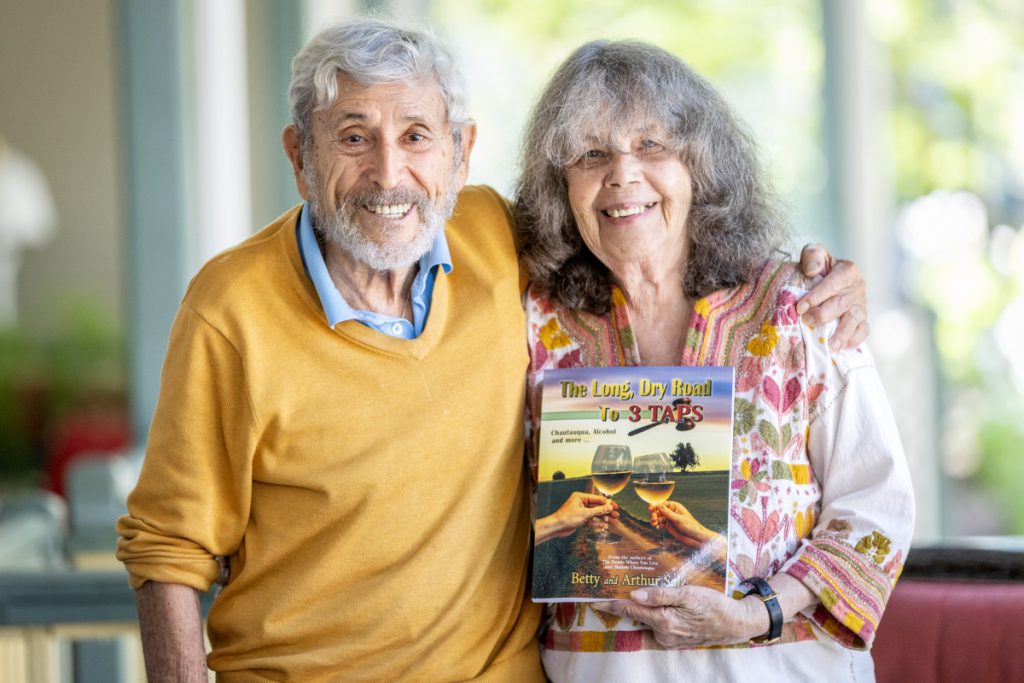
Mary Lee Talbot
Staff writer
Newcomers to Chautauqua are often surprised that the grounds were long a bastion of temperance with a policy of no or little alcohol allowed, let alone sold, on the grounds.
Thanks to Arthur “Arty” and Betty Salz, there is now a history of Chautauqua, temperance, prohibition and the gradual loosening of rules about alcohol.
“We actually started with the title, The Long, Dry Road to 3 Taps. We were looking for a fun project during COVID,” said Betty Salz.
A book signing will be held at 12:30 p.m. Sunday in the Author’s Alcove between Chautauqua Bookstore and the Brick Walk Cafe.
“We were looking for a temperance story, and it was right in front of us,” Arty Salz said.
The pair did not realize that the Woman’s Christian Temperance Union was born at Chautauqua during the first assembly in 1874.
“We had a big learning curve; everything was new to me,” said Betty Salz.
In the winter between 1873 and 1874, Protestant women led a crusade against local saloons. Called “praying bands,” they would kneel at the entrance of or inside the saloons. They sang hymns and prayed inside saloons until the owners agreed to close the establishment. One of the first crusades happened in nearby Fredonia, New York, and another famous crusade occurred in Hillsboro, Ohio.
Several of these women came to Chautauqua for the Sunday School Assembly in 1874 and planned to develop “a sober second thought,” a national organization for women to work for voting rights and to protect families from the abuses of alcohol.
Chautauqua Institution co-founders John H. Vincent and Lewis Miller might not have known the women were working on this new organization, but the group requested that Vincent give a talk endorsing the new initiative. He agreed, and from Chautauqua, the organizers sent a national call for women to gather in Cleveland in November 1874 to establish the WCTU. Francis Willard led the WCTU from 1879 until her death in 1899.
“I fell in love with this woman,” Arty Salz said. “She was an amazing woman who struggled to find her place in her family and society. Her family hoped she would marry Charles Fowler, president of Northwestern University, but she realized that she was a lesbian and decided to lead her life as a single woman. She had what was then called a ‘Boston marriage,’ two women living as a couple whom the world thought were single and living together for safety.”
While Willard was much admired in the 19th century, she was not perfect. Ida B. Wells, a leader of the anti-lynching movement, called Williard’s moral leadership into question when Williard made moral compromises and used incendiary language in order to get Southern women to join the WCTU. Their war of words took place in the international press. The WCTU eventually passed resolutions opposing lynching, but Williard’s legacy was complicated.
The WCTU continued to actively participate in the programs of Chautauqua until 2000. Kellogg Hall (now Fowler-Kellogg Art Center) was built as a WCTU headquarters at Chautauqua. The house at 32 South Lake was built by the WCTU in 1925 as a vacation home for field staff. The fountain in front of the house was dedicated to Anna Gordon, Willard’s companion and secretary and head of children’s work for the WCTU. Since at least 1954, the Tri-State Assembly, an organization of Alcoholics Anonymous groups in New York, Ohio and Pennsylvania, have met at Chautauqua.
The Long, Dry Road takes readers through the national Prohibition debate, the passing of the 18th Amendment to the U.S. Constitution outlawing liquor production and sales, to the end of Prohibition, and then returns to Chautauqua’s stance.
The Salzes bought their house at Chautauqua in 1971. There was a clause in their deed, as in all Chautauqua deeds, that the use of alcohol in the home was prohibited.
“We discreetly broke the law as we had wine with our Shabbat dinner,” Betty Salz said. “We kept the bottle on the floor of the dining room.”
They did not realize that many other Chautauquans subverted the lease in very creative ways. The last chapter of the book is full of stories about “Chautauqua Tea,” and the “4:30 Ice Call at the Athenaeum.”
One of the answers that eluded them for a long time was when the restriction on alcohol was removed from Chautauqua property deeds. A conversation with Chautauqua County historian Michelle Henry provided the answer. She found that it disappeared in 1996.
In 2006, the Daily began accepting advertisements for liquor sales outside the grounds. The story ends with the establishment of bars in the Athenaeum and at the Pier Building with 3 Taps in 2021.
The Long, Dry Road to 3 Taps is on sale at the Chautauqua Bookstore.




